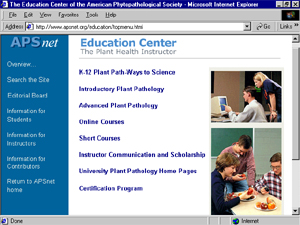Contributed by
Gail L. Schumann
Editor-in-Chief
APS Education Center
University of Massachusetts
Amherst, MA
APSnet now provides access to the most comprehensive clearinghouse of
peer-reviewed instructional resources on plant pathology and closely related
disciplines at www.apsnet.org/education.

Students and Instructors are already benefiting from the Education Center's freely-accessible, peer-reviewed, and citable materials. |
|
Instructors Use and Publish with the
Education Center
The new APSnet Education Center is designed to benefit both students and instructors. K–12 teachers and instructors in plant pathology, biology, and microbiology can choose from the many freely-accessible online materials to enrich their courses. Teaching notes and articles provide a means to contribute to the scholarship of plant pathology pedagogy. Instructors can receive recognition for contributing materials to the site. All materials are peer reviewed and citable as publications in The Plant Health Instructor. Even plant pathologists who never enter a classroom can contribute their knowledge and insights to students worldwide by publishing materials in the APSnet Education Center or by becoming an online mentor.
Students and Professionals Access Materials Available Nowhere Else
Students have access to quality instructional materials created by a variety of instructors with expertise in many areas. The resources may also be used for continuing education. Plant health professionals and extension clientele can review basic knowledge and update their education in quickly changing areas. Online, peer-reviewed publication assures accurate and current information with color images and other instructional technologies not available in traditional textbooks.
I encourage you to visit www.apsnet.org/education to enrich your courses. Complete plant disease lessons, an illustrated glossary, resource guides, and a number of other items are already available. I also invite you to contribute to the APSnet Education Center and share your expertise with students around the world.
RETURN TO APSnet FEATURE STORY
